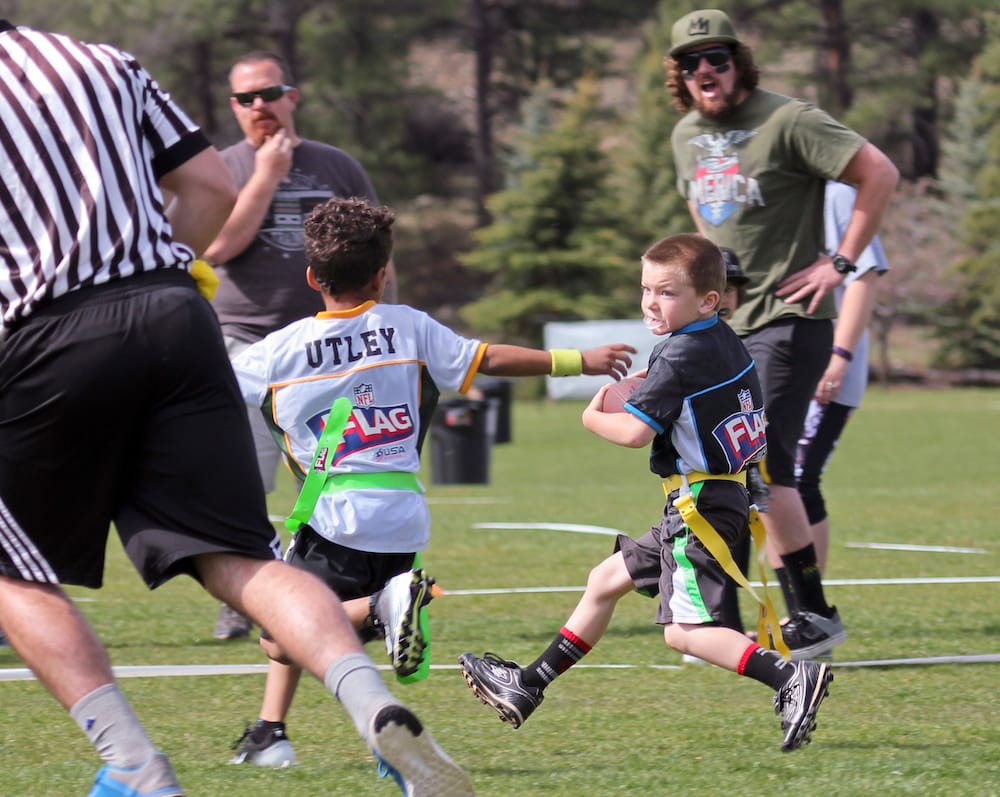How to root for your kid in sports without crossing the line of poor sportsmanship. Plus advice on how to handle losses and what to do when your child wants to bail mid-season.

If you have at least one child in recreational or club sports, odds are you’ve experienced it. Parents and extended family members sitting quietly and respectfully in collapsible canvas chairs of varying heights, perhaps fiddling with phones or plying younger siblings with auxiliary snacks, when out of nowhere, it rings out — like the first mortar at Fort Sumpter: “C’MON, REF!” The source could be a dad, a mom, or even a grandma, red-faced and wild-eyed, primed for a fracas. Everyone nervously glances in the direction of the sound, but they already know: A parent has lost control. Will they storm onto the field and hassle the teenage referee? Will they throw their water bottle like a toddler who just learned that it’s bedtime? It doesn’t matter, because this unfortunate individual has already outed themselves as a Bad Sports Parent.
Sadly, the Bad Sports Parent is everywhere, in every city and town, and in every sport. In fact, it’s such a common affliction, psychologists have come up with a name for it: Little League Parent Syndrome. Among the symptoms: ranting, raving, inappropriate comments, criticism and disparagement of coaches, to name few. Obviously, this behavior is bad for kids — all kids within earshot, not just the offender’s kids — and for the community at large. So, how can we work to reduce our risk of turning into a Bad Sports Parent? We’ve rounded up a few tips for you below, based on input from local coaches.
Game Etiquette
Most parents already know that screaming at people in general is not good etiquette, but according to Brandon McNeil, chief operating officer of United PDX soccer club and board vice president of the Portland Youth Soccer Association, good sideline behavior comes down largely to the expectations and mores set by the coach and club leadership.
“Crazy sideline behavior tends to invite more crazy in,” he says. “We work hard to model and educate from a leadership perspective. A lot of times it’s a reflection on the leadership and head coach: (If) you’ve got a yeller and screamer, you’re going to get a yeller and screamer on the sideline because they see that behavior is OK. It goes a long way if you set the tone and expectations.”
Thankfully, after more than 20 years of coaching, McNeil has plenty of tricks to help parents help themselves. First? Bring a chair. “If you’re sitting down, you’re not a player at that point — you’re not standing up and moving. That movement gets your emotions and heart rate up,” McNeil says.
Second? Try sitting alone. “Being off in your own space allows you to not get caught up in the masses,” McNeil says. “That crescendo as a kid gets close to the goal to shoot, you can just say, ‘Oh man, nice, that was a great play,’ stuff like that, under your breath instead of getting caught up in the rah-rah cheering. This is not professional sports — the level of cheering is different at a Blazers game versus your kid’s Saturday-morning game at Delta Park.”
Finally, consider keeping your mouth busy to remove any temptations. “Another thing I’ve seen that works is having a lollipop in your mouth, or coffee to drink,” McNeil says. “I’ve even seen coaches hand out lollipops on the sideline, like, ‘Hey, you’re here to take in the game, not coach the game.’”
Supporting vs. “Stage-Parenting”

If you’re unhappy with how much play time your child got, how the game went, or anything else related to your child’s performance, the absolute worst thing you can do is fire off an angry email to the coaches, says David Carr, owner of Carr Sports Academy in Southeast Portland. Not only are you probably still heated from the moment, you probably don’t know as much as you think you know about your kid’s abilities. The healthiest way to support your child is to let them manage their own experience.
“If a kid’s not playing, have your kid talk to the coach,” Carr says. “A lot of parents want their kid to play all the time, and they want to win. Not everyone’s kid is going to be the best player, and having that understanding of where your kid falls and supporting them to speak up for themselves is a big thing. If it comes from the parent, it’s going to sound more like complaining, and I can tell you as a coach and someone who runs a big club, it’s not beneficial for the kid in any way. Having (your) kid talk to the coach goes further and means more to the coach and the team. It tells us this kid cares about his development and wants to know what he can do to potentially earn minutes.”
Carr is so adamant about keeping high emotions at bay that his club has a rule about coaches giving parent emails a 24-hour buffer, so everyone can have time to reflect on the game instead of firing off a reactionary rejoinder. In the end, however, the best tack is still to just let your kid handle it.
“I’m one of seven kids,” Carr says. “My mom might have said something to a coach once, and my dad never said anything, ever. It was always on us as players to do better, and I think that was very helpful.”
How to Handle Losing
Many sports parents are familiar with the dreaded car ride home after an unexpected loss or otherwise unsatisfactory game. McNeil says the most important thing parents can do in this situation is to hold off on any commentary until your child is ready to talk about it.
“You’ve got to wait until your kid engages with you,” McNeil says. “If a result goes a different way, or if you disagree with the coach’s decisions, that’s not on you to push onto your player or family member. They’re exploring their sport; if it’s something they’re engaged with and love, or are developing the love for, that top-down push from parents to young children generally isn’t received very well. Kids clam up. They go, ‘I don’t want to talk about it,’ or respond angrily, and that’s not a productive experience for anyone. The best thing you can do is reinforce the positive. Just say, ‘Hey, I loved to watch you play today,’ and that’s it — see where they go.”
What to do When Your Kid Wants to Skip Practice
It’s a tale practically as old as time: Your child begs to sign up for a team, you buy all the expensive gear, and several weeks later, they whine and complain when it comes time to go to the gym or field. What not to do in this situation, according to Carr, is to give in.
“If a kid doesn’t want to show up at the beginning of the season, you can’t force a kid to play. But if a kid doesn’t want to show up during, say, the middle of the season, the parent has to remind them that, ‘Hey, you committed to this and you’ve got to follow through with your commitment to your teammates and to playing,’” Carr says. “Sports can demonstrate valuable lessons down the road. It’s important for kids to learn to do things they don’t necessarily want to do once they’ve committed … if you constantly bail your kids out and allow them not to go, it’s only going to enable them to bail on commitments throughout their life.”
If they’re really sick or legitimately hurt, Carr clarifies, that’s a valid excuse. But they’re just feeling tired, or they have a bruise? “They’re not going to learn the lesson that ‘I may not feel great, I don’t want to go, but I’ve got to show up and do my best,’” Carr says. “That’s the main thing kids can get out of sports — how to be a team player. If kids learn that lesson, it’s just as valuable as playing Division 1 or whatever. It’ll help them the rest of their lives.”
Now that you know how to be a good sports parent, here’s a handy guide on youth leagues and sports across the Portland area. Gooo team!
